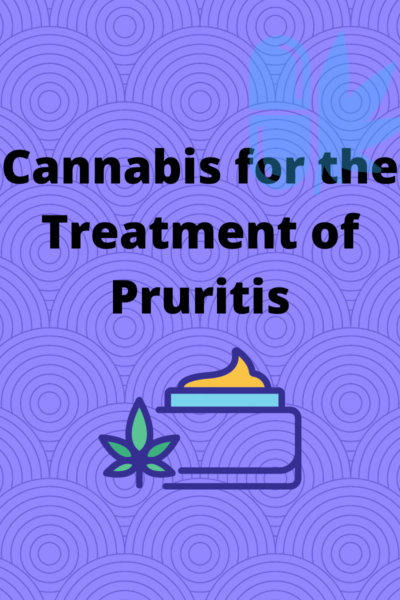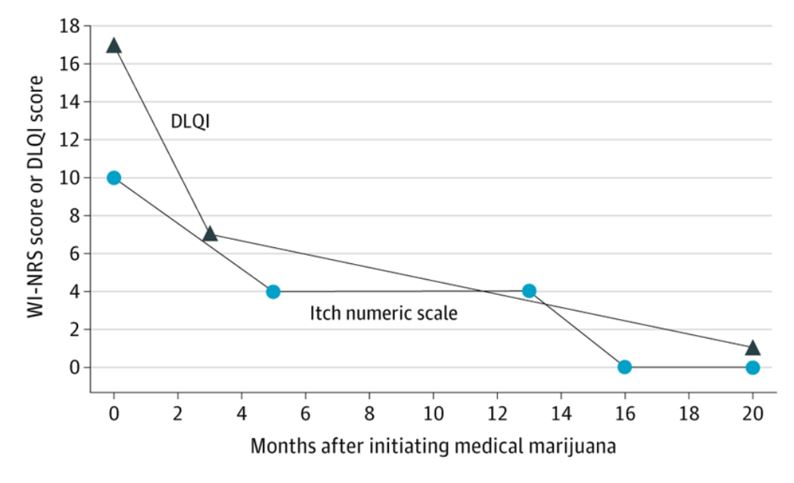
Itching is not normally considered a devastating condition, but for those with chronic pruritis (the technical name for itchy skin), it can severely impact quality of life. Itching distracts from daily tasks and at night can be responsible for insomnia. While many people successfully treat pruritis with over-the-counter or prescription topical medications, such treatments do not work for everyone. Growing evidence suggests that phytocannabinoids like tetrahydrocannabinol (THC), cannabidiol (CBD), and cannabinol (CBN), ingested internally or used topically, may help alleviate pruritis.
There is reason to believe that phytocannabinoids would benefit pruritis and other skin conditions due to abundant preclinical evidence using cells and animals. A May 2020 review article in the Journal of the American Academy of Dermatology summarized this evidence, stating that phytocannabinoids appear to modulate peripheral itch fibers and act on cannabinoid receptors in the central nervous system. The review also stated, “Clinical studies have shown a reduction in pruritus in several dermatologic (atopic dermatitis, psoriasis, asteatotic eczema, prurigo nodularis, and allergic contact dermatitis) and systemic (uremic pruritus and cholestatic pruritus) diseases.” Furthermore, a December 2020 review article published in the Journal of Dermatological Treatment reported, “Cannabinoids have demonstrated anti-inflammatory, antipruritic, anti-ageing, and antimalignancy properties by various mechanisms including interacting with the newly found endocannabinoid system of the skin thereby providing a promising alternative to traditional treatments.”
One of the human studies referred to above documented patients who used a topically-applied CBD product to treat eczema. 16 patients completed a survey which measured disease severity through the Patient Oriented Eczema Measure and Quality of Life Hand Eczema Questionnaire scales. Scores on both measures decreased significantly after using CBD, and 67% of patients specifically reported a decrease in itch, while 50% perceived a greater-than 60% improvement in their eczema symptoms overall.
Furthermore, a 2017 article in Science Daily featured a quote from Dr. Robert Dellavalle, associate professor of dermatology at the University of Colorado, School of Medicine. He stated the anti-inflammatory effects of phytocannabinoids may be responsible for their benefits on skin, including itching. For example, he mentioned a study where eight of 21 patients who used a phytocannabinoid cream twice a day for three weeks experienced complete relief of severe pruritis. The constituents of this cream were not apparent, but nonetheless further supports the potential of topical phytocannabinoids for treating pruritis.
While CBD topicals are among the most popular options for patients who seek to use phytocannabinoids to treat pruritis, internal ingestion of other phytocannabinoids appears to also yield benefits. A case study published in April 2021 in the journal JAMA Dermatology described the profound results experienced by a woman who resorted to using phytocannabinoids for chronic pruritis after conventional treatments like topical corticosteroids and phototherapy failed. Interestingly, she only used one of two cannabis products two nights a week – either smoking an 18% THC-rich indica flower, or sublingually ingesting a 1:1 THC:CBN tincture. This is notable because no topical application was utilized, CBD was apparently not a prominent feature of treatment (with CBN being used instead), and treatment was only intermittent. However, within 10 minutes of the initial use of cannabis, apparently smoking, the patient’s Worst Itch Numeric Rating Scale score improved from 10/10 to 4/10. This reduction continued for over 1-year. At the 16-month follow-up, the chronic pruritis had resolved completely, as evidenced by the score decreasing to 0/10. This was sustained until the 20-month follow-up and apparently never increased again. The Dermatology Life Quality Index (DLQI), a measure of quality-of-life, also improved dramatically, from a top score of 17 down to 1 over 20 months.

While more evidence is needed, the existing material supports the controlled use of phytocannabinoids for chronic pruritis. Given the remarkable safety profile of cannabis, it makes sense to consider it as a treatment, especially when other therapies prove ineffective. Research into what delivery methods and phytocannabinoid combinations are most effective is especially warranted.
